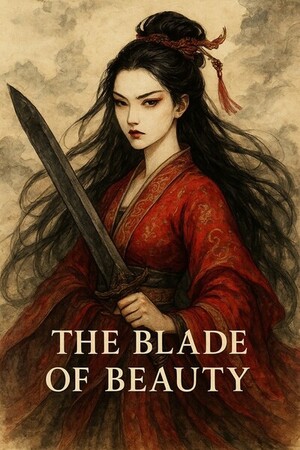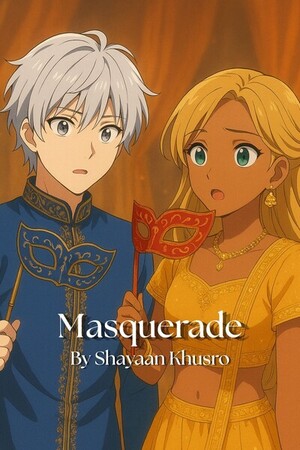Chapter 33:
Banquets of Memory and Forgetting
I, a Hermaphrodite, Live by Taking Lives
Thus, we remained at the Western Jin prince’s estate. On the second night, Gongsun Yanshu awoke. Upon waking, his appetite returned with a vengeance. He ordered the kitchens to prepare fine wine and rich dishes in abundance, then came storming into our rooms, dragging both me and Gongsun Bai from our beds in the dead of night, demanding that we join him in drinking beneath the moon.
I yawned until my jaw ached, wishing I could split his skull with an axe just to end my torment. Gongsun Bai, however, remained calm. He ate a few mouthfuls, then asked evenly, “Do you remember what day it is today?”
“Of course I do,” Yanshu replied cheerfully, popping a peanut into his mouth. “Isn’t it the day of my wedding? They say I married a seventy-year-old cook. I did wonder at my taste becoming so peculiar, but perhaps I was just looking for a change of flavor. Anyway, I went to see her—hah!—she turned out to be a corpse. Been dead for days already, stinking up the place. I quickly had her buried. Later, someone told me she’d saved my life several times. I had nothing else to give her, so I offered myself in marriage instead. Tell me, doesn’t that sound like the most cliché plot from a marketplace romance book?”
I spat wine across Bai’s sleeve. He merely wiped it off, his expression unchanging. “Cliché? Perhaps. But you acted your role with enthusiasm. Your madness is… troublesome.”
Yanshu chuckled sheepishly. “Don’t worry. I won’t take your betrothal gift. Tomorrow I’ll have the treasurer return it to you.” With that, he and Bai clinked cups and drank again.
As for why he insisted on marrying a dead cook, the official story was this: Gongsun Yanshu had accidentally consumed some barbarian herb. The herb altered the heart, shifting desires unnaturally. His obsession with the cook was thus explained away as poisoning. Fortunately, Bai had arrived in time, bringing with him a learned physician—me. Skilled in herbs and antidotes, I had “cured” the poison.
Shi Wen, loyal steward, helped spread this tale, and so the truth remained concealed.
That night, the drinking lasted until well past midnight. By the next day, I slept until the sun stood high overhead. When I finally stirred, my head pounded as though beaten by hammers. Parched, I sat up, and in that moment noticed a faint ribbon of azure smoke drift through the window. In the sunlight it was almost invisible. Following it outside, I found a bird waiting.
A blue bird.
The smoke was rising from its feathers. When it saw me, it lifted its beak and let out a cry. Then it opened its claws. A letter dropped into the dust. The bird beat its wings and vanished into the sky.
The letter was from my master.
He wrote that my body housed the bone of a Fanghua Beast, a divine creature beyond gender. Every four months, it underwent transformation—commonly called “metamorphosis.” This lasted seven days. In those days, the beast would fall into deep slumber, and when it awoke it would be one sex or the other—male or female—each with equal chance. Because his bone resided within me, I too inherited this curse. My master added in a footnote: if I disliked the term “metamorphosis,” I could call it “sudden change.”
“Sudden change,” he said, as though words could soften the blow. Counting on my fingers, I realized the timing of the next change fell within days.
A tremor ran through me, near fainting. Then I noticed another page tucked beneath. On it my master’s hand was firm: he was leaving. The bond of master and disciple between us was ended. I was not to seek him again. We should part, each cherishing the other from afar.
The words struck me harder than any hammer. My chest tightened, my breath caught. Leaving. To leave, in stories, was always to die. Could my master truly be walking toward death? But how? He was a half-immortal, one who had stepped beyond the cycle of Three Realms and Six Paths. Death should not touch him.
Still, my mind swirled with dread. I read the words again and again until my vision blurred. At last my eyes closed, and tears spilled free. My master was my rebirth, the parent of my soul. Without him, I would have perished a thousand times already.
I had to find him. No matter what.
I began packing my belongings at once, but before I could leave the room, weakness swept over me. My steps turned light and unsteady. Again, I counted. Three days remained before the sudden change.
No. No one could discover my secret.
I gathered my pack, determined to slip away. But when I opened the door, Gongsun Bai was there, leaning against the frame. How long he had been waiting, I could not say. His gaze raked me up and down.
“You’re leaving?”
“Yes. Urgent business.”
“What business?”
“Personal. Very urgent.”
“No matter how urgent, you must still eat. Yanshu has gone to the palace to invite the imperial chef, all to treat you. Will you eat?”
“…I’ll eat,” I muttered, shame flooding me.
He smirked. “Not so urgent after all?”
“What matter can outweigh breakfast?”
“…”
He led me to the dining hall. Yesterday it had been resplendent for the “wedding.” Today it was stripped bare, chill and empty. Servants whispered happily in corners, relieved that their young master had returned to sanity.
Within, only one round table remained. Yanshu sat, sipping porridge. Two maidens stood at his side, serving him. He looked the very picture of a carefree rake. I thought bitterly, Wan Ling would never love such a man.
Seeing us, Yanshu brightened. “At last! The food waits for you.”
We sat.
The table was crowded with plates upon plates, stacked and pressed together, as though a banquet for kings. For mere breakfast, it was obscene.
Yanshu smiled with false modesty. “I wasn’t sure what pleased Master Su’s palate, so I told the chefs to prepare specialties from all four kingdoms. That way, wherever your home may be, you’ll taste it here.”
I plucked a slice of lotus root and grinned. “No need. I am of Nanchuan.”
His brows rose. “Oh? From which city? Forgive me, you’ve aided me greatly, yet I don’t even know your full name. Only that you are Su, nothing more.”
“My name is Su Qi.”
The steamed dumpling fell from his chopsticks with a plop. One maid knelt to clean it. Slowly, Yanshu turned his gaze upon Bai. Bai continued eating, unperturbed.
I shrugged. “I know what surprises you. You’re thinking of General Su’s son, the one who died. It’s only a shared name. Nothing more.”
So blunt a statement left him awkward. He forced a laugh, but then his hand went to his chest, caressing something within his robe. In that instant, his expression softened, tender as spring water.
Only then did I notice the pendant at his throat. An old, phoenix-shaped trinket. The very one he had given Wan Ling long ago. But had he not forgotten her? Why did he still wear it?
Catching my stare, he drew it out casually. “What’s this? Interested in my pendant?”
“It… is unusual,” I managed.
“Of course. I choose only what matches my own elegance.”
Bai snorted. “Elegance? Look at you. Boots of agate, robes of Shu embroidery, jade pin in your hair—every piece priceless. Yet that pendant is rough, cheap silver at best. It makes you look shabby.”
Yanshu paused, glancing at his outfit. Then he turned to the maids. “Do you think so too?”
They giggled behind their sleeves.
He propped his chin on his hand, pondering. “Perhaps. But people judge not clothes, only station. If I wore sackcloth, they’d call it new Shu embroidery. If I begged in rags, they’d say beggar-chic had swept Shaodu. After all, I am always at the forefront of fashion.” With a grin, he tucked the pendant back into his robe, showing it no more.
After breakfast, I prepared to leave. Bai did not see me off. Only Yanshu came, holding out the purple-gold incense burner. “Master Su, don’t forget this.”
I had nearly forgotten indeed. I thanked him, but as I turned to go, he stopped me.
“Master Su,” he said quietly, “if a man forgets something… can he ever remember it again?”
A chill struck my heart. He had already sensed something amiss.
“If you wish to recall,” I answered, “seek me. But know this: whether memory returns is not mine to command. In this world, what is forgotten… is meant to be forgotten. Memory is not always a blessing.”
And with that, I turned away.




Please sign in to leave a comment.